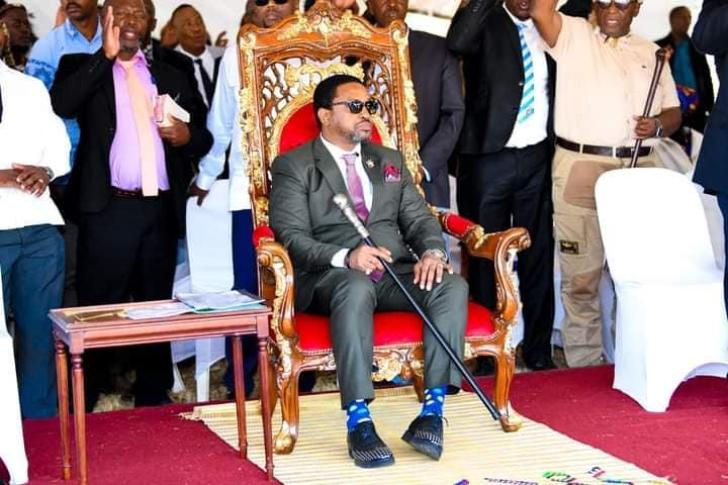News / Local
Britain tried to exile Zulu King to Zimbabwe
20 Oct 2024 at 11:26hrs |
0 Views

In a remarkable revelation, King Misuzulu KaZwelithini recently shared that the British-governed Natal Province of South Africa sought to exile Zulu King Dinuzulu to Bulawayo, Zimbabwe - an area also under British rule following the overthrow of Ndebele King Lobengula in 1893. This disclosure was made during a joint commemoration event honoring the legacy of King Dinuzulu, held in Middelburg, Mpumalanga, where the king passed away 111 years ago.
Dinuzulu, the son of the illustrious Zulu King Cetshwayo, ascended to the throne in 1884 amidst the disintegration of Zululand due to British invasions. Cetshwayo had previously led the Zulu nation during the Anglo-Zulu War of 1879, famously presiding over the British army's most significant defeat at the Battle of Isandlwana. Following the war, Sir Garnet Wolseley, the British administrator of Natal, imposed a new political arrangement on the Zulu nation, which included the banishment of Cetshwayo and the division of Zululand into 13 territories, each ruled by appointed chiefs.
This restructuring led to significant unrest among the royalist factions known as uSuthu, who opposed the authority of the appointed chiefs, particularly Chief Zibhebhu of the Mandlakazi, who was viewed as Cetshwayo's greatest adversary. The resulting tensions marked the beginning of a civil war within the Zulu nation.
As Cetshwayo's brothers sought his return from exile, civil strife intensified, with supporters raiding the homesteads of their opponents. After Cetshwayo returned in 1879, he faced defeat again at the hands of Zibhebhu, leading to his flight into the Nkandla forest and later to Eshowe. Cetshwayo's sudden death on February 8, 1884, possibly due to poisoning, allowed Zibhebhu's supporters to gain dominance in northern Zululand, further complicating the succession of the royal lineage.
Dinuzulu, only 15 years old at the time of his father's death, was taken to safety in the Transvaal by his uncles, who feared for his life amidst the ongoing conflict. In early 1884, they sought assistance from a group of Boers along the Transvaal border to secure the royal lineage's future. On July 5, 1884, supported by mounted Boers, Dinuzulu's faction managed to defeat Zibhebhu at the Battle of Entshaneni in the Lebombo Mountains.
King Misuzulu emphasized that it was General Louis Botha, a prominent figure from Greytown, who ultimately influenced the British-governed Natal Province to abandon its plans to exile Dinuzulu to Bulawayo. This historical episode not only highlights the turbulent history of the Zulu nation but also reflects the complex dynamics of colonial power and resistance during that era.
As South Africa continues to reckon with its historical narratives, King Misuzulu's address serves as a reminder of the resilience and struggles faced by the Zulu people in their quest for sovereignty and recognition.
Dinuzulu, the son of the illustrious Zulu King Cetshwayo, ascended to the throne in 1884 amidst the disintegration of Zululand due to British invasions. Cetshwayo had previously led the Zulu nation during the Anglo-Zulu War of 1879, famously presiding over the British army's most significant defeat at the Battle of Isandlwana. Following the war, Sir Garnet Wolseley, the British administrator of Natal, imposed a new political arrangement on the Zulu nation, which included the banishment of Cetshwayo and the division of Zululand into 13 territories, each ruled by appointed chiefs.
This restructuring led to significant unrest among the royalist factions known as uSuthu, who opposed the authority of the appointed chiefs, particularly Chief Zibhebhu of the Mandlakazi, who was viewed as Cetshwayo's greatest adversary. The resulting tensions marked the beginning of a civil war within the Zulu nation.
Dinuzulu, only 15 years old at the time of his father's death, was taken to safety in the Transvaal by his uncles, who feared for his life amidst the ongoing conflict. In early 1884, they sought assistance from a group of Boers along the Transvaal border to secure the royal lineage's future. On July 5, 1884, supported by mounted Boers, Dinuzulu's faction managed to defeat Zibhebhu at the Battle of Entshaneni in the Lebombo Mountains.
King Misuzulu emphasized that it was General Louis Botha, a prominent figure from Greytown, who ultimately influenced the British-governed Natal Province to abandon its plans to exile Dinuzulu to Bulawayo. This historical episode not only highlights the turbulent history of the Zulu nation but also reflects the complex dynamics of colonial power and resistance during that era.
As South Africa continues to reckon with its historical narratives, King Misuzulu's address serves as a reminder of the resilience and struggles faced by the Zulu people in their quest for sovereignty and recognition.
Source - online
Join the discussion
Loading comments…


































